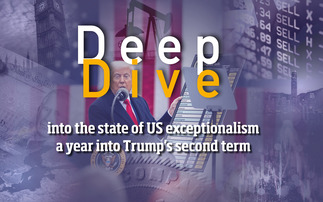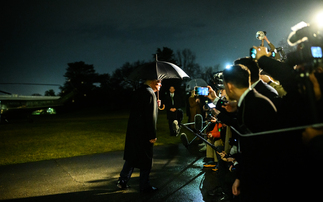In this second of a special three-part Big Question, managers tell Investment Week that investors need to keep a more vigilant and realistic eye on the economy now that Donald Trump has begun his first term as US President.
Gero Jung, chief economist at Mirabaud Asset Management
'Trump Light' or 'Donald Dark'?
As one fellow analyst put it, the main question around the incoming US administration's economic priorities is whether policy will be guided along a "Trump light" agenda, or, alternatively, "Donald Dark" policies will prevail.
Financial markets, for the time being, believe in the former, as evidenced by the surge in government bond yields in November and December last year and the strong outperformance of cyclically-sensitive risk assets.
We are more prudent in our economic forecasts, and await hard economic data to catch up with buoyant sentiment. In particular, we would like to see further details on how big the fiscal stimulus package will be on the one side, and which sectors will profit from possible tax decreases on the other.
Also, the sequencing between the two measures will be crucial: tax declines are likely to be implemented first, possibly having a lower impact on economic growth. As always, the devil is in the details.
Fiscal impulses will be felt only in the fourth quarter this year at the earliest - thus economic growth is likely to remain in line with trend growth of 2% for the whole of 2017.
Furthermore, we note that monetary policy will become less accommodative, with the Federal Reserve projecting at its latest FOMC meeting that three policy rate hikes are on the table now.
Less easy monetary policy, together with a stronger greenback, are factors that will present headwinds to growth. And, certainly, it is unlikely to help overcome one of the main economic problems, which is dismal productivity growth due to, among other reasons, low companies' investments.
Salman Ahmed, chief investment strategist at Lombard Odier Investment Management
'Bazooka' to the economy
2016 was dominated by market uncertainty, meaning investors were unable to form strong views until new information came along to provide greater clarity.
With the election of Donald Trump, however, markets moved to at least some certainty: a fiscal stimulus is going to take over from eight years of unorthodox monetary stimulus, and it is going to be a "bazooka". Some appointments, such as to the Treasury and the SEC, also tells us something about his priorities, and markets have rightly picked up on it.
But the more certain markets become, the more risky things get. When things are ‘priced for perfection' against a view of some certainty, new information really can jog investors into sudden re-positioning, and that pushes volatility up.
For investors, 2016 was an age of uncertainty. But 2017 could well be a new age of risk. It might surprise many by being both more certain in political outcomes and more volatile in markets.
Adrian Brass, fund manager at Majedie
Expectations
Hope that Trump's policy proposals will lift the growth profile of the US economy has arguably taken expectations to euphoric levels. Markets are pushing new records and valuations, while consumer and business confidence indicators are at levels not seen since the Internet bubble.
Many of Trump's policy proposals are clearly positive, with tax being the most material. Should corporate tax be lowered to the proposed 15% rate, the average S&P500 company would likely experience more than a 10% boost to earnings and some domestically-oriented companies up to a 40% boost.
We urge caution for two reasons, however. Firstly, passing legislation through Congress, even with a Republican majority, takes time.
We are unlikely to see any benefit from taxes and certainly infrastructure for at least a year from now, and yet have to deal with a stronger dollar, rising wage inflation and higher financing costs.
Secondly, Trump's unorthodox and often antagonistic communication through social media, as well as his protectionist slant, risk a foreign trade backlash.Overall, we believe the market offers many exciting investment opportunities, but that one needs to be cognisant of valuations and expectations.













